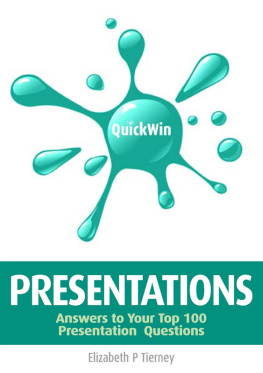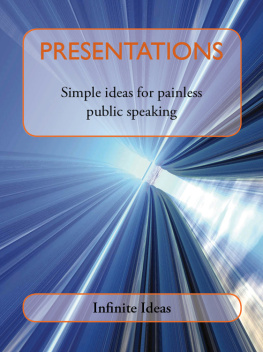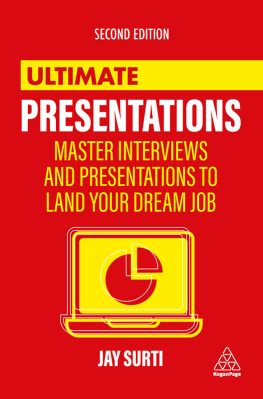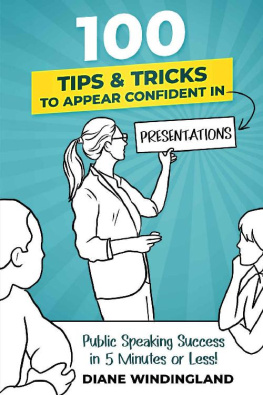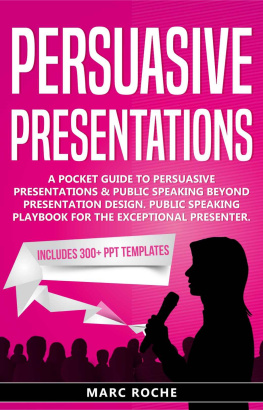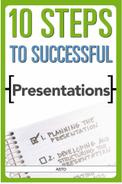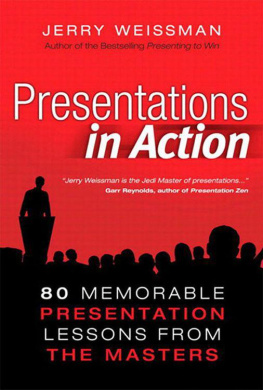A catalogue record of this book is available from the British Library.
All rights reserved. No part of this publication may be reproduced or transmitted in any form or by any means, including photocopying and recording, without written permission of the publisher. Such written permission must also be obtained before any part of this publication is stored in a retrieval system of any nature. Requests for permission should be directed to Oak Tree Press, 19 Rutland Street, Cork, Ireland.
INTRODUCTION
If asked to name our greatest fear in doing business, many of us would admit that we are most terrified at the notion of having to speak before a group. But it is an essential part of doing business. We have to give talks of one kind or another frequently. In one week, busy business-people may be called upon to speak to the Board of Directors on Monday, to 10 colleagues at a departmental meeting on Tuesday morning, to 50 interested investors on Wednesday, to their personal staff of three in the office on Thursday, to a hiring panel on Friday or to an audience of 300 at a conference held at a hotel on Saturday. Thats six presentations. Your list is probably longer. But it may have to be if you wish to be successful.
Because speaking in public can be an unnerving experience, QUICK WIN PRESENTATIONS is written to help you decrease some of the anxiety that you are feeling as well as to offer tips and techniques for enhancing your talks. To do that, the book examines the process from beginning to end and offers answers to your top 100 presentation questions.
QUICK WIN PRESENTATIONS is designed to break the process of presenting into parts, thus enabling you to search for the answers to your key questions. The better you understand the process, the more confident, credible and effective you will be as a speaker and the better able you will be to influence others, to demonstrate your talent and to represent your organisation.
There are five sections to this ebook:
- Presentation Essentials covers some of the fundamental questions that all speakers have about what makes an effective speaker, what is really involved in the communication process, the importance of understanding and keeping your focus on the audience and on having a clear message.
- Developing a Presentation addresses the design of a speech or talk itself. Specifically, this section answers questions about the importance of designing a strong opening, logical middle and powerful closing.
- Presentation Tips & Techniques answers questions ranging from word choices to aspects of verbal and non-verbal language, and it includes topics like handling your nerves, knowing the venue, preparing for questions and designing visuals.
- On the Day looks at the last-minute details and your emotions.
- Afterwards looks at your ongoing development as a speaker.
QUICK WIN PRESENTATIONS is designed so that you can dip in and out seeking answers to your top presentation questions as they arise. Answers to your queries can be located not only from the contents list but also by using the subject grid at the start of the book and by following the thread of cross-references provided at the end of each Q&A.
The questions asked and answered in this ebook include questions I have encountered time and again from business people over many years through my consulting and training work. I hope you find the ebook helpful.
Elizabeth P Tierney
Lenox, MA
April 2012
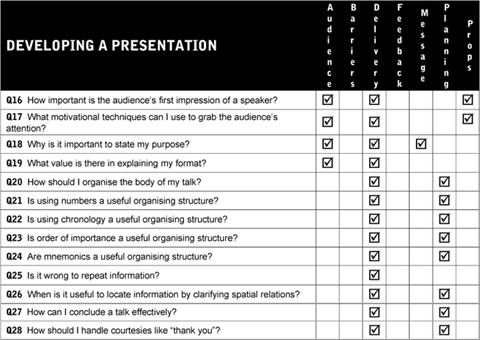
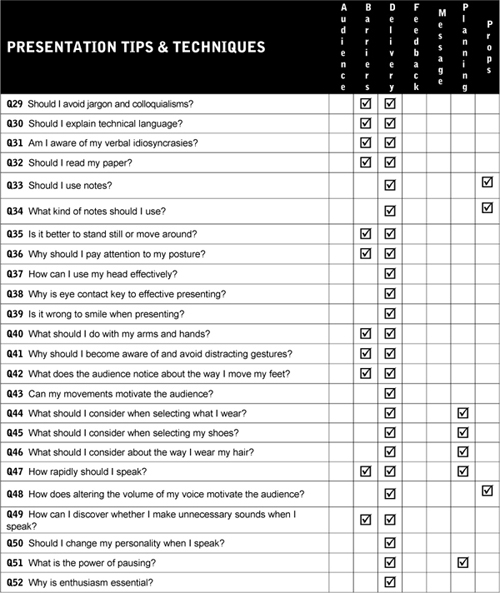
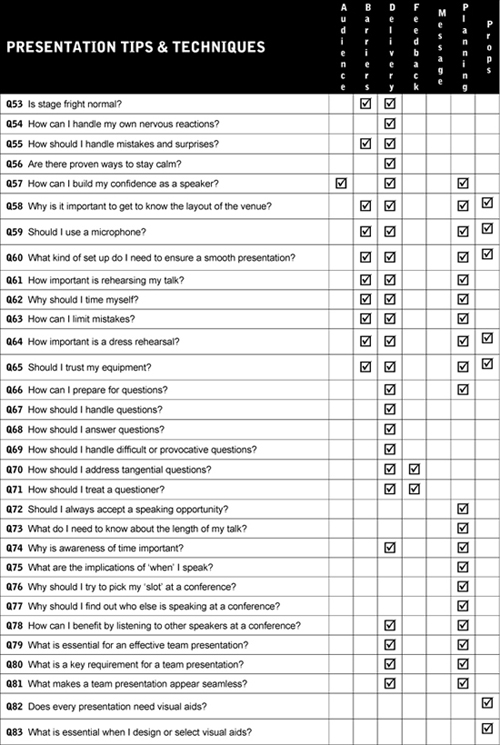
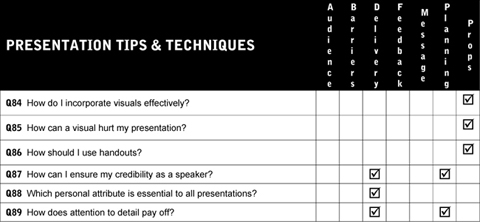
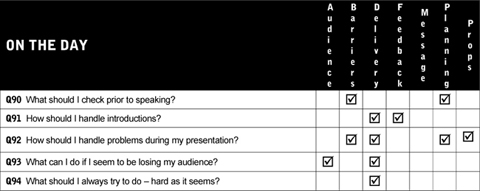
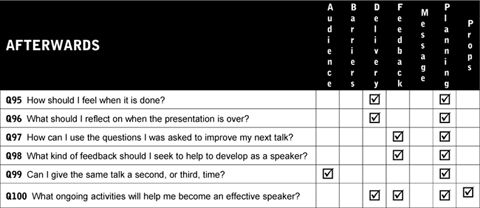
PRESENTATION ESSENTIALS
Q1 What makes an effective speaker?
Think about speakers you have heard throughout your life and in your career. Who are they? You may notice that they have come from all walks of life: politicians, members of the clergy, educators, athletes, entertainers or business people. Can you identify why you recall them? What particular characteristic brought them to mind? Whatever the specific reason you remember them, they reached you.
Good speakers are memorable and have an impact on others. One reason that you remember them is that they recognised their ability to make a difference in their audiences lives. And they used it.
Good speakers respect their audiences and understand how the communication process works. Effective speakers also know what ensures successful communication and what prevents it. They know their own weaknesses as speakers and try to eliminate them. They use their strengths.
They appreciate that the talk they are giving can affect the people to whom they are speaking. They recognise that they can make the audience laugh, take notice or cry. They also can make an audience angry.
While the topic may or may not always be monumental, the speakers may be suggesting ideas that might make your life easier or more difficult. They may be recommending dress-down days, the take-over of another company, or the purchase of a particular service or product. While you may not consider introducing dress-down days as earth-shattering, the concept may be a morale booster for the audience. Therefore, suggesting the idea may indicate to the listeners that the speaker is sensitive to their needs in the work environment.
Effective speakers recognise the opportunities they have for making change, and they seize the moment. They do not assume that the only important talks that they are going to make are at annual presentations to the Board of Directors or at the Eastern Regional Sales Conference. They know that short in-company talks in their own offices count, too. For you to be good as a speaker, you have to believe that your ideas are important. So, it doesnt matter whether you are speaking to a group of five in your office or to a group of 400 simultaneously in Brussels and New York by video-conference.
Unlike dress-down days, introducing the notion of a take-over may have powerful financial implications for individuals and organisations. While there may be great risks, the potential exists for great opportunities too. In the same way, if you can convince someone to buy your product, that purchase may enhance the way they live or work. Your widget may save money, time or human resources for them and increase your profits, too. In effect, when you speak never underestimate the significance of your words to the people listening to you.

